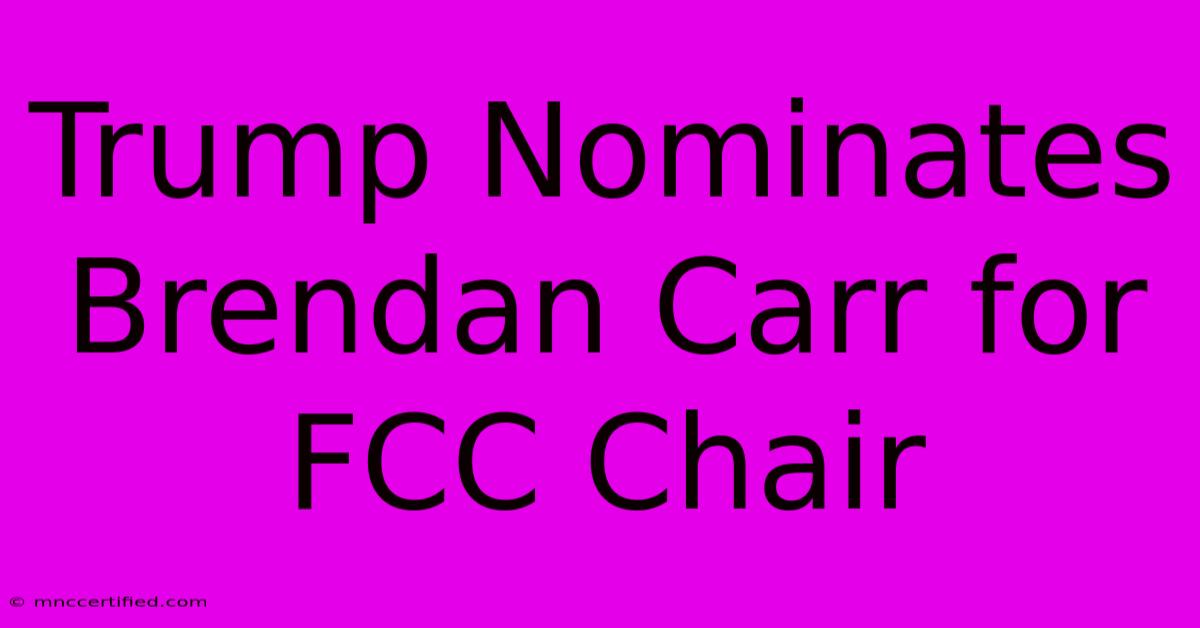Trump Nominates Brendan Carr For FCC Chair

Table of Contents
Trump Nominates Brendan Carr for FCC Chair: A Deep Dive into the Nomination and its Implications
On July 26, 2018, President Donald Trump nominated Brendan Carr to serve as Chairman of the Federal Communications Commission (FCC). This nomination sparked significant debate and analysis, given Carr's conservative stance and his previous work at the commission. This article will delve into the details surrounding this nomination, exploring Carr's background, his policy positions, and the broader implications of his appointment.
Brendan Carr: A Profile of the Nominee
Before his nomination, Brendan Carr served as a Republican commissioner on the FCC. His background includes experience as a lawyer specializing in communications law and his work in the private sector. This experience played a significant role in shaping his views on telecommunications policy, particularly concerning issues like net neutrality, media ownership, and the role of technology companies. He built a reputation as a strong advocate for deregulation and a staunch critic of what he viewed as government overreach in the tech sector.
Key Policy Positions and Voting Record
Carr's voting record at the FCC prior to his chairmanship indicated a consistent conservative approach. He was a vocal opponent of net neutrality, supporting the repeal of the Obama-era rules that classified internet service providers as common carriers. He also favored policies that promoted competition in the telecommunications market, often through deregulation measures. His views on media ownership were generally aligned with a less restrictive approach, favoring policies that allowed for greater consolidation in the industry. Understanding his pre-chairmanship stances provides crucial context for analyzing his actions once confirmed.
The Nomination Process and Confirmation Hearing
The nomination process itself faced scrutiny. While the specifics of the hearings and confirmation votes are readily available through official government archives (and readily accessible through search engines using relevant keywords like "Brendan Carr FCC confirmation hearing transcript"), it’s important to note that these proceedings often involve intense political debate, highlighting the partisan nature of FCC appointments. Analyzing these proceedings allows for a comprehensive understanding of the arguments for and against Carr's nomination. The level of opposition, if any, and the arguments presented by both supporters and detractors shed light on the political climate surrounding the appointment.
Arguments For and Against the Nomination
Arguments in favor of Carr's nomination often emphasized his expertise in telecommunications law and his commitment to promoting competition and innovation in the industry. Supporters believed his policies would foster economic growth and benefit consumers. Conversely, critics argued that his conservative stance on net neutrality and media ownership would harm consumers and stifle innovation. They raised concerns about potential conflicts of interest and the impact of his policies on issues like digital equity and access to broadband internet.
Implications of Carr's Chairmanship
Carr's appointment as FCC Chairman had significant implications for the direction of telecommunications policy in the United States. His chairmanship shaped regulatory decisions concerning:
- Net Neutrality: His opposition to strong net neutrality rules influenced the commission's approach to managing internet traffic and preventing discriminatory practices by internet service providers. This remains a highly debated topic, with significant implications for internet access and online freedoms.
- 5G Deployment: The rollout of 5G networks was a key policy area during his tenure, and his policies may have impacted the speed and efficiency of this process.
- Media Ownership: His views on media consolidation impacted the FCC's approach to regulating mergers and acquisitions in the broadcasting and media sectors.
- Broadband Access: The expansion of broadband access, especially in underserved communities, was another crucial aspect influenced by his policies.
Conclusion: Long-Term Impacts and Ongoing Relevance
The nomination of Brendan Carr to chair the FCC remains a significant event in the history of telecommunications policy in the United States. Analyzing his tenure requires understanding the broader political context and the long-term consequences of his decisions on the American telecommunications landscape. His legacy continues to shape debates surrounding net neutrality, digital equity, and the evolving relationship between government regulation and the tech industry. Researching his post-chairmanship activities and commentary offers further insights into the ongoing impact of his time as FCC Chairman. Using keywords like "Brendan Carr post FCC," "Brendan Carr current position," or "Brendan Carr impact on telecom policy" can yield further relevant information.

Thank you for visiting our website wich cover about Trump Nominates Brendan Carr For FCC Chair. We hope the information provided has been useful to you. Feel free to contact us if you have any questions or need further assistance. See you next time and dont miss to bookmark.
Featured Posts
-
National States Insurance Company
Nov 19, 2024
-
Ukraine To Receive Storm Shadow Missiles From Uk
Nov 19, 2024
-
Parks Thanksgiving Weekend Announcement
Nov 19, 2024
-
Jolie At 2024 Event Vintage Chic
Nov 19, 2024
-
Insurance For Bars And Nightclubs
Nov 19, 2024